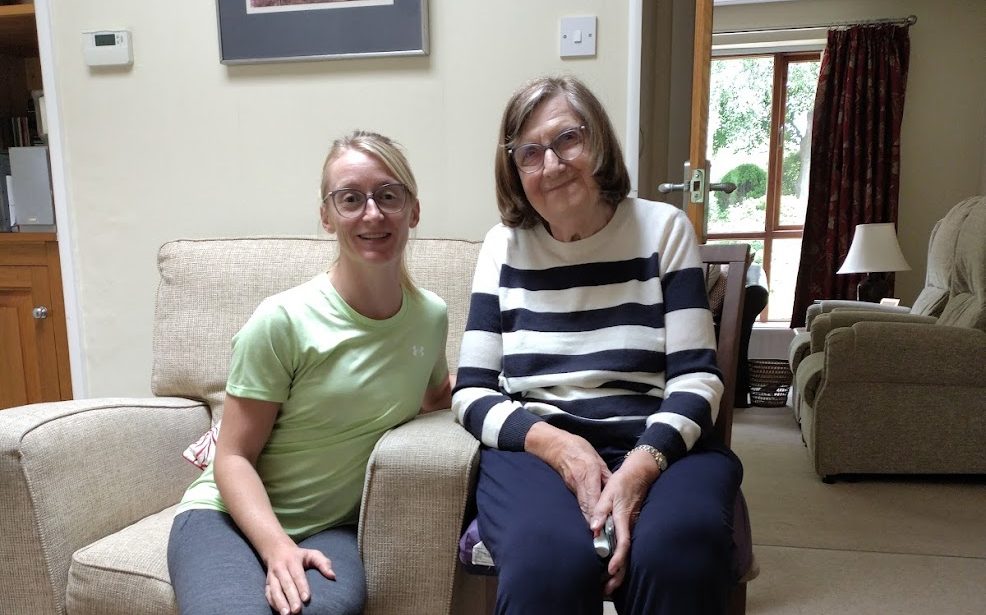In this Spotlight, we share the work of Emma from Activation Health, a Specialist Public Health Nurse and Health & Movement Coach. One part of Emma’s work is supporting clients to improve mobility, confidence and independence, often in partnership with Promedica24 live-in carers. She discusses why early intervention is important, how to recognise when someone might need support, and the benefits of a joined-up approach to care.
Supporting Mobility and Confidence
Staying active should be part of everyday life, but as Emma from Activation Health points out, many people only begin structured exercise or mobility work after illness, injury, surgery, or a noticeable decline in independence. Early intervention, she says, can prevent further deterioration and lead to faster, more complete recovery.
“Unfortunately, we often wait too long before engaging in physical activity,” Emma explains. “The earlier we can begin targeted, personalised support, the more we can preserve strength, confidence and quality of life.”
There are often signs that someone may benefit from support, even if they do not ask for it. These can include increased reliance on furniture or other people when walking, avoiding stairs or certain rooms, moving more slowly, showing visible fear of falling, or withdrawing from activities they once enjoyed. Emma says these changes can be noticed during routine visits or conversations, and that gentle encouragement and information at this stage can make a difference.
One of Emma’s North Lancashire clients, Ann, was referred to her after being discharged from a rehabilitation home. Ann was on an NHS waiting list for further physiotherapy, which had not yet begun. At that time, she was using a wheelchair and needed help to transfer to the commode with a ReTurn and frame. Her balance and strength were reduced, and she was fearful of falling.
Through tailored mobility sessions and the consistent help of her live-in carer and support from Care Consultant Gary Derbyshire, Ann began to regain confidence. Her carer, Ivona, provided day-to-day insight into Ann’s progress, encouraged her to practice exercises between visits, and recognised when to offer more support or step back.
Within weeks, Ann was able to stand without help and walk from her lounge to the kitchen using her frame.
“It’s very important for us to work closely with other health and social care professionals,” Gary Derbyshire, Care Consultant at Promedica24 Lancashire, Cumbria & North Yorkshire, explains. “By sharing knowledge and working as a team across disciplines, we can make sure people like Ann get the right kind of support to live safely at home, and families don’t feel like they’re managing everything on their own. A joined-up approach benefits everyone.”
Emma says collaboration between services such as Activation Health and Promedica24 provides a more complete service, combining clinical knowledge with daily, practical support. In Ann’s case, this partnership allowed her to continue her recovery at home, maintain independence, and keep making progress while waiting for NHS services to begin.
By combining specialist input from professionals like Emma with consistent, attentive support from trained carers, people are better able to remain in familiar surroundings and maintain their independence. For referral partners, understanding the options available and encouraging clients to explore them fully helps ensure that the right type of care is chosen for the individual, not just the most immediate or convenient route. A thoughtful, collaborative way of planning can make the difference between simply managing day-to-day needs and truly supporting long-term wellbeing.
To learn more about how live-in care can support you or your loved one, reach out to your local Care Consultant or call 0800 086 8686 to speak to our team.
More from our blog

What Does Live-in Support Look Like for Autistic Adults?
If you’re an autistic adult considering your living options, you might be exploring ways to maintain your independence and live your life whilst having the right support in place. Live-in support offers a personalised approach that allows you to live in your own home with dedicated one-to-one assistance tailored to your needs and preferences. What […]
Read More
Managing Sensory Needs at Home: Working with Your Live-in Support Worker
Your home should be a place where you can relax, unwind and feel comfortable. When you have live-in support, establishing clear communication about your sensory needs helps create an environment that truly works for you. Understanding your sensory preferences Autistic people can be much more or less sensitive to sensory experiences than non-autistic people, according […]
Read More
Live-In Support vs Supported Living for Autistic Adults: What’s the Difference?
If you’re an autistic adult exploring long-term support options, two of the most common arrangements are live-in support and supported living. Both can provide structure and assistance, but they work in very different ways. Understanding these differences can help you decide which might be the better fit for your lifestyle and preferences. Live-in support Live-in […]
Read More

